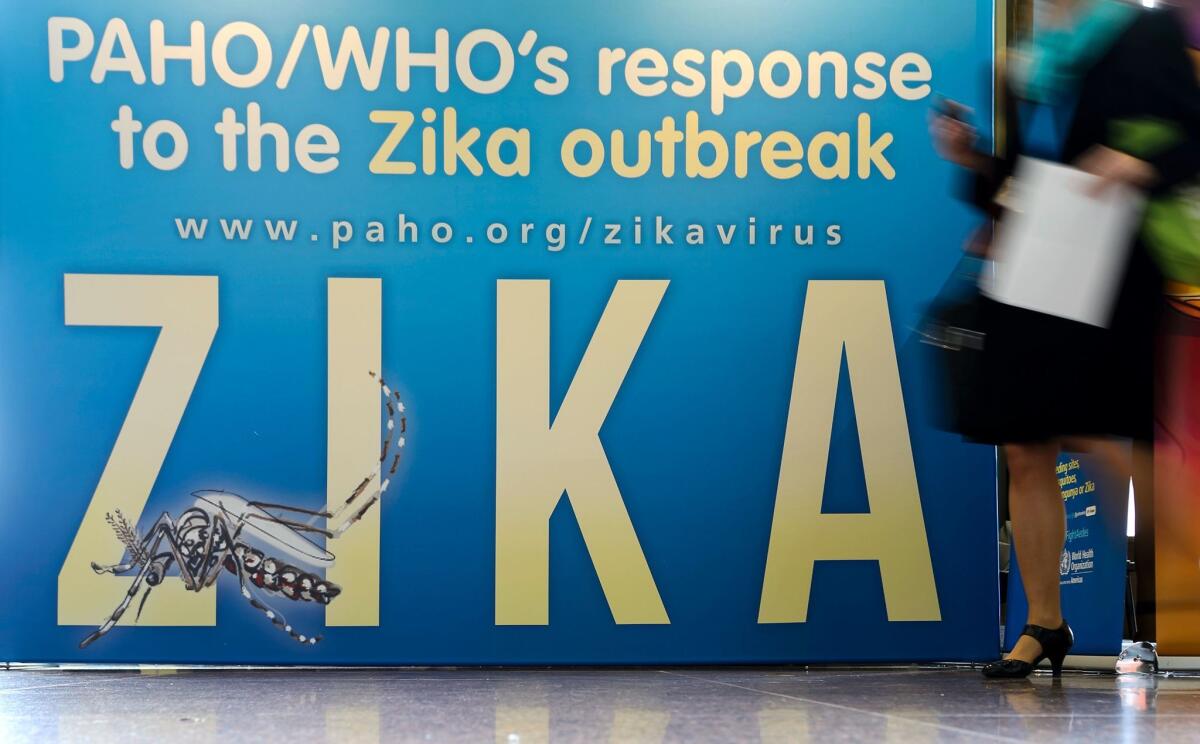Column: Congress exploits Zika to loosen pesticide regulations (but won’t pay for an anti-Zika program)

- Share via
Chronic dysfunction on Capitol Hill is often cause for amusement, but not when lives and public health are at stake. That’s what’s happening now, with the menace of the spread of the Zika virus to the United States becoming ever more concrete.
The House and Senate haven’t been utterly idle on the Zika front. Their actions have been merely inadequate and cynical. Both chambers have proposed funding plans to combat Zika -- the Senate at $1.1 billion, the House at $622 million. But neither matches the $1.9 billion President Obama requested in February, and the House proposal would raid other disease programs to cover the bill.
The House went one head-shaking step further this week. On Tuesday, the Republican-dominated chamber voted, mostly along party lines, to loosen pesticide regulations, ostensibly in the name of fighting Zika. (Voting with the GOP majority were 23 Democrats, reports the Hill.) The House commitment, however, went no further than rebranding an old anti-regulation measure, the Reducing Regulatory Burdens Act, as the “Zika Vector Control Act.”
For years to come, these children will be a visible, human reminder of the cost of absurd wrangling in Washington.
— Former White House official Ronald A. Klain
That’s the only substantive change in a measure originally drafted in 2011 to roll back permitting requirements for pesticide spraying near certain bodies of water. The Reducing Regulatory Burdens Act was high on the wish list of the pesticide industry.
For the industry and its handmaidens in Congress, Zika is a heaven-sent window for killing clean water protections. In a statement Tuesday, House Speaker Paul Ryan (R-Wis.) lamented that “onerous new EPA regulations have completely hamstrung mosquito control activities.” He called the permits targeted by the bill “duplicative,” and claimed they “have made it extremely expensive and nearly impossible for districts to control mosquito populations.”
Environmental advocates say that’s nonsense: the rules don’t interfere with mosquito control, which can be done on an emergency basis in any event. What’s needed, say public health experts, is the money to manage Zika outbreaks, which the House hasn’t provided.
People with experience in fighting disease outbreaks are befuddled by Congress’ resistance to action on Zika. “Of all the things that Congress could be truculent about, fighting an epidemic is the worst imaginable,” wrote Ronald A. Klain, who managed the Obama administration’s Ebola response in 2014 and 2015, wrote Sunday in the Washington Post.
“Zika is not ‘coming’ to the United States: It is already here,” Klain added. The Centers for Disease Control and Prevention are monitoring 279 pregnant women in U.S. states and territories who have tested positive for the virus. As the summer mosquito season arrives in the South, Klain observed, the chances for widespread infection via mosquito bites and sexual transmission will rise.
The consequences of inaction will be stark. Babies born to infected women have a high rate of microcephaly, a physical and neurological condition with lifelong implications. “It is not a question of whether babies will be born in the United States with Zika-related microcephaly,” Klain wrote -- “it is a question of when and how many. For years to come, these children will be a visible, human reminder of the cost of absurd wrangling in Washington, of preventable suffering, of a failure of our political system to respond to the threat that infectious diseases pose.”
Cheeseparing budget cutters on Capitol Hill should also contemplate the fiscal implications of a Zika outbreak. As health insurance expert Richard Mayhew observes at balloon-juice.com, Zika’s medical complications are likely to fall most heavily on the public health programs -- read Medicaid -- of Southern states. Medicaid already covers 45% of all U.S. births, but the rate is much higher in the South -- 69% in Louisiana, 67% in Arkansas, 64.7% in Mississippi, etc.
Some of these states are in what may become known as the Zika Belt, and those patients are chiefly on legacy Medicaid, for which the federal government covers 30%-50% of the budget. (For Medicaid expanded via the Affordable Care Act, the government pays more than 90% -- but many Southern states also have refused to accept the expansion.)
“So we would have very expensive cases concentrated on publicly provided insurance rolls in states that stingily fund their safety net,” Mayhew figures. “A state that has several hundred covered lives with Zika-related birth defects on their Legacy Medicaid plans will be in significant financial trouble.”
Mayhew believes these costs might prompt lawmakers to move Medicaid closer to a national health insurance system, but that would require the sort of vision that Congress has been unable to muster in recent years. It’s more likely that the Zika crisis will be a reminder of the old saw that delaying investments now only lead to greater expenses down the line. Will the lesson take?
Keep up to date with Michael Hiltzik. Follow @hiltzikm on Twitter, see his Facebook page, or email [email protected].
Return to Michael Hiltzik’s blog.
More to Read
Sign up for Essential California
The most important California stories and recommendations in your inbox every morning.
You may occasionally receive promotional content from the Los Angeles Times.











